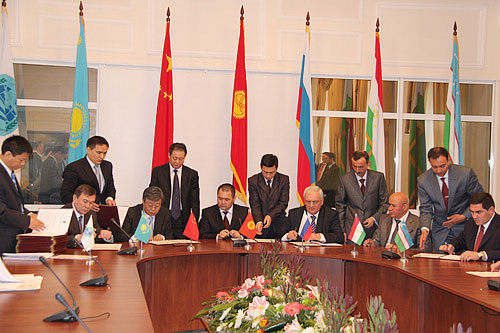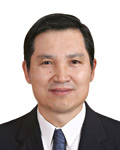|
 |
|
TACKLING TERRORISM: Delegates pledge to strengthen antiterrorism cooperation at a meeting of the Shanghai Cooperation Organization's Regional Counterterrorism Structure in Tashkent, Uzbekistan, on April 2 (DONG LONGJIANG) |
 |
|
(COURTESY OF ZHAO MINGWEN) |
Since its establishment in 2001, the Shanghai Cooperation Organization (SCO)—a regional organization grouping China, Russia, Kazakhstan, Kyrgyzstan, Tajikistan and Uzbekistan—has grown at a notable pace. With deepening cooperation in areas ranging from security to economy and culture, the SCO has become one of the most dynamic regional organizations worldwide.
Although the organization's economic and trade cooperation was greatly impacted by the international financial crisis, the complementary and mutually beneficial relations among its members have remained unchanged. Instead, their aspirations for deepening cooperation have only grown stronger.
China-Russia benefits
In the nine years since its inception, the organization has held increasingly strategic value for China and Russia—the two powers in the SCO.
The SCO is the only regional organization allowing China to play a relatively bigger role in its activities and receive greater benefits from doing so. It bears strategic significance for China in resisting attempts by U.S.-led Western countries to contain China's peaceful development. And the SCO plays an irreplaceable role in expanding China's foreign economic and trade cooperation, and ensuring the country's energy and resource security.
For Russia, the organization is also the most dynamic among the various organizations it has joined. The SCO serves as an important strategic support system as it resists the restraints of the West.
Given that the Russian-led Common-wealth of Independent States (CIS) and Collective Security Treaty Organization (CSTO) are weakening, the SCO has become one of the most effective platforms for Russia to present its appeals and concerns.
The SCO can help Russia raise its status and enable it to restore influence in Central Asia, where it competes fiercely with the United States.
Under the framework of the SCO, Russia expects to crack down on separatism and religious extremism affecting its political stability with the help of China's influence. In the meantime, it aims to prevent the penetration of Western countries led by the United States and increase vitality for economic cooperation in the region.
Although Russia holds no sway over the temptations of the West toward Central Asian resources, it can prevent smaller countries from following suit through its involvement in the SCO and cooperation with China.
In a word, the SCO will remain an important strategic platform for both China's and Russia's peaceful development in the foreseeable future.
A dynamic mechanism
The SCO's dual-engine (China and Russia) mechanism is brimming with vitality. The reasoning behind China's push for across-the-board SCO cooperation is simple: It strives to promote good neighborly friendship and common development with other member states and ensure regional security and stability. It does not seek dominance in the organization or in Central Asian affairs.
Although China and Russia have competing interests in some economic and trade cooperation programs with Central Asian countries, China remains a partner for Russia.
Moreover, China has always adopted a legitimate, reasonable and fair spirit while competing with Russia. In a number of construction projects, such as a hydropower plant in Tajikistan, China withdrew and conceded the projects to Russia, since Russia had been heavily involved prior to China's interest.
Therefore, though competition exists between the two countries, it serves only as an interlude rather than a significant theme in the mutually beneficial cooperation between these two partners. The competition China and Russia do experience is never similar to conflicts between two rivals, and it can often be resolved through friendly consultations.
It is through this consensus that China and Russia can effectively ensure the unhindered operation of the dual-engine mechanism of the SCO.
| 